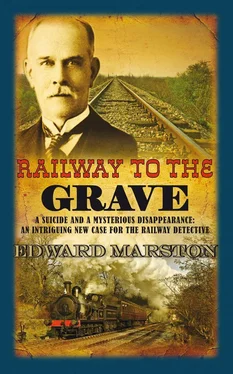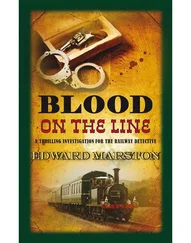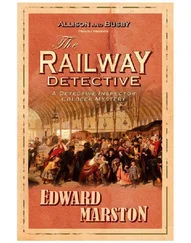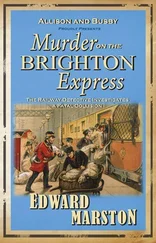Edward Marston - Railway to the Grave
Здесь есть возможность читать онлайн «Edward Marston - Railway to the Grave» весь текст электронной книги совершенно бесплатно (целиком полную версию без сокращений). В некоторых случаях можно слушать аудио, скачать через торрент в формате fb2 и присутствует краткое содержание. Жанр: Исторический детектив, на английском языке. Описание произведения, (предисловие) а так же отзывы посетителей доступны на портале библиотеки ЛибКат.
- Название:Railway to the Grave
- Автор:
- Жанр:
- Год:неизвестен
- ISBN:нет данных
- Рейтинг книги:5 / 5. Голосов: 1
-
Избранное:Добавить в избранное
- Отзывы:
-
Ваша оценка:
- 100
- 1
- 2
- 3
- 4
- 5
Railway to the Grave: краткое содержание, описание и аннотация
Предлагаем к чтению аннотацию, описание, краткое содержание или предисловие (зависит от того, что написал сам автор книги «Railway to the Grave»). Если вы не нашли необходимую информацию о книге — напишите в комментариях, мы постараемся отыскать её.
Railway to the Grave — читать онлайн бесплатно полную книгу (весь текст) целиком
Ниже представлен текст книги, разбитый по страницам. Система сохранения места последней прочитанной страницы, позволяет с удобством читать онлайн бесплатно книгу «Railway to the Grave», без необходимости каждый раз заново искать на чём Вы остановились. Поставьте закладку, и сможете в любой момент перейти на страницу, на которой закончили чтение.
Интервал:
Закладка:
Shutting off steam, the driver applied the brakes but there was no hope of stopping in such a short distance. All that they could do was to watch in horror as he strode deliberately towards the hurtling train. They had hit animals before when they’d strayed on the line but this was a very different matter. Here was a flesh and blood human being – a man of substance, by the look of it – advancing towards them with an air of challenge about him. It shook them. At the last moment, both driver and fireman turned away. The impact came and the train surged on, carriage after remorseless carriage rolling over the mangled, blood-covered corpse on the track.
Shocked by what had happened, the fireman emptied the contents of his stomach over the footplate. The driver, meanwhile, feeling somehow guilty at the hideous death, closed his eyes and offered up a prayer for the soul of the victim. When the squealing train finally ground to a halt amid a shower of sparks, the driver was the first to jump down from the locomotive and run back up the track. He kept going until he reached the lifeless body, buffeted into oblivion and spread untidily across the sleepers. The face had been smashed to a pulp and the walking stick split into a dozen pieces. What caught the driver’s attention, however, were not the gaping wounds and the misshapen limbs. It was a piece of paper, pinned to the man’s coat and flapping about in the breeze.
He bent down to read Colonel Tarleton’s last request.
‘Whoever finds me, notify Superintendent Tallis of the Detective Department at Scotland Yard.’
CHAPTER TWO
Detective Inspector Robert Colbeck liked to make an early start to the working day but the cab ride to Scotland Yard showed him that London had already been wide awake for hours. The pavements were crowded, the streets thick with traffic and the capital throbbing with its distinctive hullaballoo. Glad to reach the restorative calm of his office, he was unable to enjoy it for even a moment. A constable told him to report to Superintendent Tallis immediately. There was a note of urgency in the man’s voice. Colbeck obeyed the summons at once. After knocking on Tallis’s door, he let himself into the room even though he was given no permission to do so. He soon saw why.
Wreathed in cigar smoke, the superintendent was leaning forward across his desk, supporting himself on his elbows and staring at some invisible object in the middle distance. Beside him was a bottle of brandy and an empty glass. Colbeck knew that something serious had happened. Consuming alcohol while on duty was anathema to Edward Tallis. He’d dismissed several men from the Metropolitan Police Force for doing just that. Strong drink, he argued, only impaired the mind. If he was ever under pressure, he would instead reach for a cigar. The one between his lips was the third that morning. The blackened vestiges of its two predecessors lay in the ashtray. Tallis was in pain.
‘Good morning, sir,’ said Colbeck.
The superintendent looked up. ‘What?’
‘You sent for me, I believe.’
‘Is that you, Inspector?’
‘What seems to be the problem?’
Tallis needed a moment to compose himself. Taking a last puff on his cigar, he stubbed it out in the ashtray and waved a hand to disperse some of the fug. Then he pulled himself up in his chair. Noticing the bottle, he swept it off the desk and put it away in a drawer. He was plainly discomfited at being caught with the brandy and tried to cover his embarrassment with a nervous laugh. Colbeck waited patiently. Now that he could see his superior more clearly, he noticed something that he would not have believed possible. Tallis’s eyes were moist and red-rimmed. He’d been crying.
‘Are you unwell, Superintendent?’ he asked, solicitously.
‘Of course not, man,’ snapped Tallis.
‘Has something upset you?’
The explosion was instantaneous. ‘The devil it has! I’m in a state of permanent upset. How can I police a city the size of London with a handful of officers and a woefully inadequate budget? How can I make the streets safe for decent people when I lack the means to do so? Upset? I’m positively pulsing with rage, Inspector. I’m appalled by the huge volume of crime and by the apparent indifference of this lily-livered government to the dread consequences that it produces. In addition to that…’
It was vintage Tallis. He rumbled on for a few minutes, turning the handle of his mental barrel organ so that his trenchant opinions were churned out like so many jangling harmonies. It was his way of establishing his authority and of trying to draw a veil over the signs of weakness that Colbeck had observed. The inspector had heard it all before many times but he was courteous enough to pretend that he was listening to new-minted judgements based on sound wisdom. He nodded earnestly in agreement, watching the real Edward Tallis take shape again before him. When he’d regained his full confidence, the superintendent extracted a letter from his pocket and handed it over. It took Colbeck only seconds to read the emotive message.
‘Goodbye, dear friend. Though her body has not yet been found, I know in my heart that she is dead and have neither the strength nor the will to carry on without her. I go to join her in heaven.’
Colbeck noticed the signature – Aubrey Tarleton.
‘Is the gentleman a relation of yours, sir?’ he asked.
‘We were comrades-in-arms,’ replied Tallis, proudly. ‘Colonel Tarleton was an exemplary soldier and a treasured friend.’
‘I take it that he’s referring to his wife.’
‘They were very close.’
‘When did the letter arrive?’
‘Yesterday morning,’ said Tallis, taking it from him and reading it once more with a mixture of sadness and disbelief.
‘Then we may still be in time to prevent anything untoward happening,’ suggested Colbeck. ‘I see from his address that he lives in Yorkshire. Trains run regularly from King’s Cross. Would you like me to catch the next one to see if I can reach your friend before he does anything precipitous?’
‘It’s too late for that, Inspector.’
‘Oh?’
‘This telegraph was on my desk when I arrived.’ He indicated the piece of paper and Colbeck picked it up. ‘As you see, it tells of the death of a man on the railway line not far from Thirsk. A note was pinned to his coat, saying that I should be contacted.’
‘Yet no name of the man is given,’ said Colbeck, studying it. ‘The victim may be someone else altogether.’
‘It’s too big a coincidence.’
‘I disagree, sir. Colonel Tarleton was an army man, was he not?’
‘To the hilt – he came from a military family.’
‘Then he probably has some firearms in his possession.’
‘He has quite a collection,’ recalled Tallis. ‘Apart from various shotguns, he has an exquisite pair of duelling pistols.’
‘Isn’t that a more likely way for him to end his life? If, that is, he’s actually done so, and we’ve no clear proof of that. A bullet in the brain is a much quicker and cleaner way to commit suicide than by means of a railway.’
Tallis snatched back the telegraph. ‘It’s him, I tell you. And I want to get to the bottom of this.’
‘Sergeant Leeming and I can be on a train within the hour.’
‘I know, Inspector, and I will accompany you.’
‘Is that necessary?’
‘I owe it to Aubrey – to Colonel Tarleton. There has to be an explanation for this tragedy and it must lie in the death of his wife.’
‘But that’s only conjectural,’ Colbeck reminded him. ‘The letter says that she’s disappeared but no evidence is given of her demise. That’s an assumption made by the colonel. He could be mistaken.’
Читать дальшеИнтервал:
Закладка:
Похожие книги на «Railway to the Grave»
Представляем Вашему вниманию похожие книги на «Railway to the Grave» списком для выбора. Мы отобрали схожую по названию и смыслу литературу в надежде предоставить читателям больше вариантов отыскать новые, интересные, ещё непрочитанные произведения.
Обсуждение, отзывы о книге «Railway to the Grave» и просто собственные мнения читателей. Оставьте ваши комментарии, напишите, что Вы думаете о произведении, его смысле или главных героях. Укажите что конкретно понравилось, а что нет, и почему Вы так считаете.












